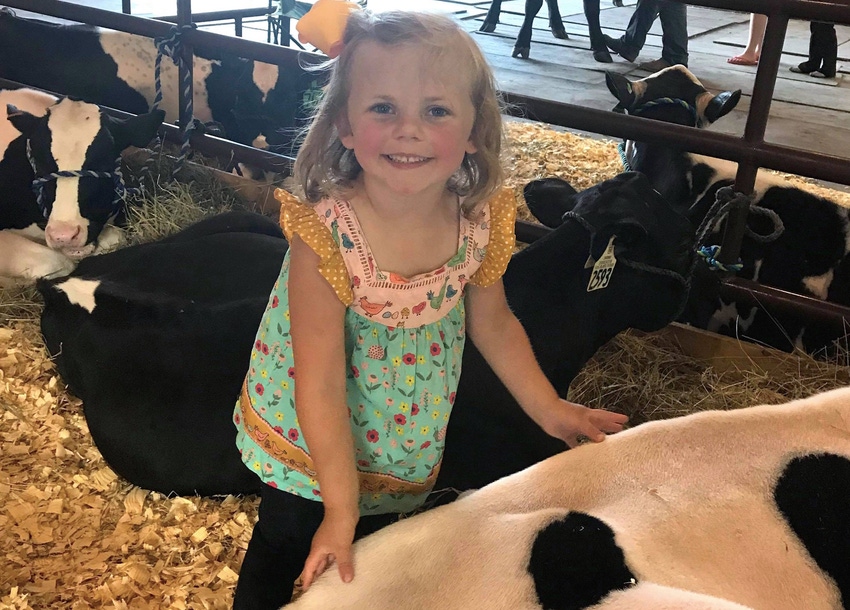4 life lessons from the county fair
Want your kids to be strong, independent and capable adults? Enroll them in 4-H and let the learning begin.
August 8, 2018

It’s county and state fair season — the best time of year for agricultural families! It’s a time where you bring your best to town, spend quality time with friends and neighbors and celebrate your life in rural America.
Plus, it’s a great way to instill important life lessons in your children. With three kids of my own, we are laying the foundation for things they will need to thrive as adults. To me, it starts at home and is cemented through participating in programs like 4-H.
Recently, we attended our local county fair, and it got me thinking about the many things I learned growing up in the 4-H program. Here are four lessons I learned that I hope to pass down to my children, as well.
1. Sometimes you win; sometimes you lose. What matters is the effort you put into it.
Growing up, my parents would often remind my sisters and I that show day wasn’t about winning or losing. It was about doing your best and being secure that no matter how the chips fall, you are confident that you put 110% effort into the project and left nothing to chance that day.
As a 4-H and FFA youth, I applied this mentality to judging contests, livestock shows and speaking competitions. If I prepared to the best of my ability and it’s enough to win, great. If I still lost, what can I learn from my competitor to do better and improve myself for next time? It really isn’t about the trophies; it’s about the lessons learned along the way.
READ: Adventures at the county fair
2. The county fair is a time to really highlight your passions and be your true self.
I attended a pretty large school as a kid, and that meant most of my classmates were city kids who didn’t know much about my life growing up on a cattle ranch. Sometimes this made me the odd-man out.
I vividly remember trying to explain what artificial insemination meant to my classmates as a sixth grader when the teacher asked us what we did over the weekend. And despite my best efforts to explain a ranchers’ role during breeding season on a cattle ranch, I was ridiculed with lewd jokes and mocked for not being like all the other kids.
At the county fair, I realized I could be me, in every sense. I could wear my Roper jeans (remember those high-waisted, colorful pants we all squeezed ourselves into?). I could work with my cattle. I could passionately present beef industry information in a 4-H speech.
And I could do it all without fear of being made fun of or teased. Why? Because the kids in 4-H got it. They were just like me, and we had a lot of shared interests to talk about. It was a refreshing change of pace from the school environment I was used to.
READ: 10 ways you know it's county fair season
3. Accepting that the fair marks the bittersweet end to a year-long project.
County and state fair season marks a time where market projects come to town. I loved showing steers and hogs growing up, but this also meant realizing that after the 4-H shows draw to a conclusion, those animals were scheduled to head to the local butcher shop. At times, this was difficult and bittersweet, but it gave me a firm understanding and respect for the circle of life.
Recently, 4-H and FFA have been criticized online by a vegan activist for desensitizing kids to killing and brainwashing youth members about eating meat from livestock they’ve raised. Of course, that’s far from the truth, and anybody who has spent time with 4-H kids knows how much they value and respect the animals under their care.
With that respect comes great maturity; these kids understand, far more than some vegan guy in the big city, that these animals benefit human life not only with meat but with by-products, too. The reality isn’t always pretty, but I would rather have my eyes wide open than to bury my head in the sand like so many of these activists like to do.
READ: County fairs are valuable experiences for kids
4. Youth in agriculture programs are designed to make you a capable adult.
How do I balance a feed ration? Budget for a new outfit? Prepare a nutritional meal? Select the best animal? Take a great photograph? Wire a lamp? Change the oil in my car? Grow the best produce in my garden? Sew a quilt? Write a report? Talk to reporters? Present a speech?
These how-to questions were all answered and learned in youth agriculture programs like 4-H and FFA. While schools are continually cutting funding for agriculture and home economics classes, these are the fundamentals for adulthood. Instilling these important and often overlooked life lessons are critical and go far beyond what we are taught in school.
If you want your children to grow up to be strong and independent, enroll them in 4-H and watch them learn, explore and thrive! In a few short years, my kids will be able to compete in 4-H activities, and I’m excited to see them put the lessons we are teaching them at home into action through the various contests and leadership activities that this organization has to offer!
The opinions of Amanda Radke are not necessarily those of beefmagazine.com or Farm Progress.
About the Author(s)
You May Also Like




.png?width=300&auto=webp&quality=80&disable=upscale)
